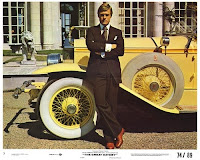 Written about the American Dream, “The Great Gatsby” is perhaps one of the greatest satires in American history. It speaks of this “self-made man” that grows from poverty to extreme wealth, but the journey is one of falsehood and deceit. Gatsby is not the man he claims to be- he is covered in lies and his whole life is a sham- the point of his life was to get the woman of his dreams, but once he fulfilled his dream, he had nothing to live for.
Written about the American Dream, “The Great Gatsby” is perhaps one of the greatest satires in American history. It speaks of this “self-made man” that grows from poverty to extreme wealth, but the journey is one of falsehood and deceit. Gatsby is not the man he claims to be- he is covered in lies and his whole life is a sham- the point of his life was to get the woman of his dreams, but once he fulfilled his dream, he had nothing to live for.
I remember the scene where Gatsby would stand on the cliff, looking over the water to a tiny green light on the other side. That green light was his fixation- the entirety of his life was to prove of his worth to Daisy, but what happens when that does happen? When she’s looking through all of his silken shirts, bought from Europe and shipped to the United States, she weeps openly and says she has never seen anything more beautiful. This is how wrapped up in themselves this society had become. Like the great parties Gatsby threw for the sake of society- the people did not know him. They started rumors, looked down upon their host all while drinking his champagne and eating his oranges.
 This is one of the main hypocrisies created by the 1920s and 1930s. The word "great" is meant to signify something grand and powerful- Fitzgerald uses it in his work to show the chicken wires under the supposed "great" society of high society. Gatsby is "great," but only to the extent of what money can buy. Greatness is not something that can be bought- it must be earned. Throwing money towards the swine will not make them respect whoever is throwing it. Image is hard to build, but easy to break, and how does Gatsby keep it from breaking? By never being close to people, but when he begins to get closer to Daisy, his already hurting image falters into an abyss of decay and distrust.
This is one of the main hypocrisies created by the 1920s and 1930s. The word "great" is meant to signify something grand and powerful- Fitzgerald uses it in his work to show the chicken wires under the supposed "great" society of high society. Gatsby is "great," but only to the extent of what money can buy. Greatness is not something that can be bought- it must be earned. Throwing money towards the swine will not make them respect whoever is throwing it. Image is hard to build, but easy to break, and how does Gatsby keep it from breaking? By never being close to people, but when he begins to get closer to Daisy, his already hurting image falters into an abyss of decay and distrust.

However, Gatsby does draw some sympathy from readers, particularly after he dies and not even the "love of his life" comes to see her beloved buried. Once again, image rules as she quietly goes back to Tom, a man she married to get over her grief and for the image his money would allow them to have. In the end, Gatsby is cast as the victim, but he is only the victim of his own lies. Love is meant to prevail over all else, but sometimes the mind overrules the heart, and once the heart gains control, life goes spiraling out of control. Striving for the prize was more rewarding than the actual prize, and this is the tragedy of the "oh-so-great Gatsby"- that he was not allowed to fully love what money could not buy him.
A very cheesy "The Great Gatsby" trailer, but it does a great (ha) job of capturing the essence of the novel.
No comments:
Post a Comment